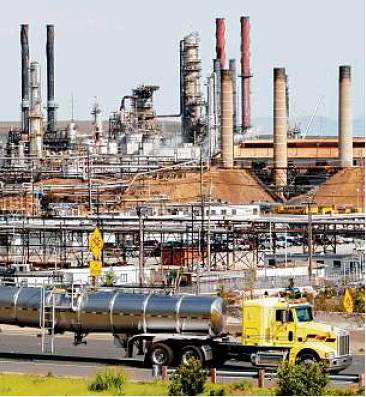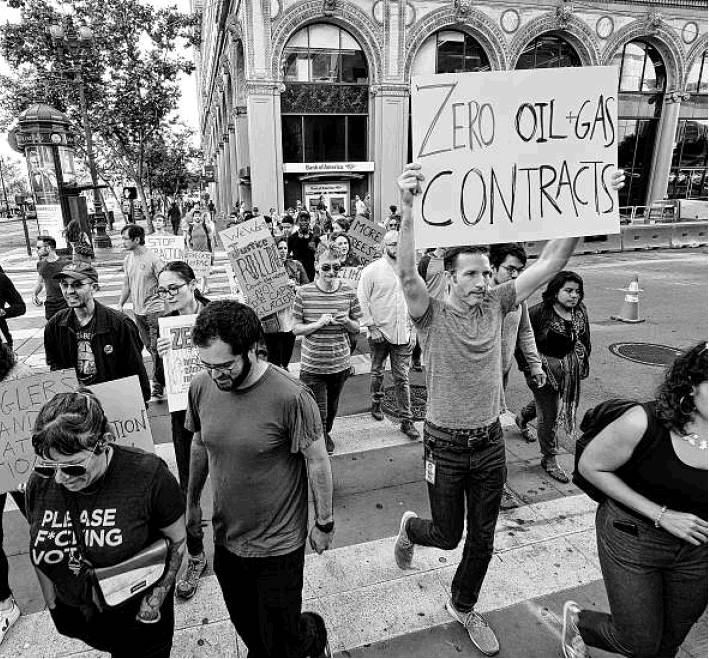Oil firms wrestle with public image
By James Osborne STAFF WRITER
WASHINGTON — On a recent Sunday afternoon a television ad ran in Washington, D.C., showing a young couple out on the town for the evening. They are dressed stylishly — of the sort who might slam “Big Oil” on social media — and then all of a sudden their night falls into chaos.
Their sneakers, their smartphones, their eyeglasses all disappear, along with the tires on their ride-sharing vehicle. A spokesman asks, “What if we lived in a world without oil and gas?”
The ad by Dallas-based pipeline company Energy Transfer quickly drew jeers online — one Twitter commenter proclaimed “Criiiinnnnnnggggggeeeeeeeeeeeee” — illustrating the challenges the industry faces as it tries to shape opinion on the energy transition without alienating a public already suspicious of oil companies.
With President Joe Biden pushing hard on climate policy, the U.S. oil and gas industry is in the middle of an advertising push to try to protect their share of an energy marketplace that is shifting away from their products. But how to best market themselves in the current political climate is an increasingly tricky task for executives. They must simultaneously declare their commitment to addressing climate change while reminding the public of the need for oil and natural gas — all while separating themselves from their climate denial of the past.
“People are trying to figure out their lane,” said Frank Maisano, a Washington public relations consultant at the law firm Bracewell. “Energy Transfer is trying to remind people how important oil and gas is in our lives. Exxon Mobil is spending a lot on Spotify ads that are very technology focused. And I’ve been pummeled with Saudi Aramco ads about hydrogen.”
While they generally share the same message about their commitment to clean energy, oil companies take different approaches when it comes to the role of their products in society. European companies like BP and Royal Dutch Shell generally stay quiet about their petroleum businesses while promoting their investments in wind and solar. But some U.S. companies and their lobbyists are vocal in warning of the dangers of shifting off fossil fuels too quickly.
The Energy Transfer ad with the young couple was conceived out of the belief held by Kelcy Warren, the company’s founder and chairman, along with other executives, that the public, particularly younger people, do not understand how integral oil and gas are to their lives, said Vicki Granado, vice president of corporate communications at Energy Transfer.
“They think they’re going to buy an electric vehicle, and they’re not going to need fossil fuels anymore, but they will,” she said. “It’s not something you would normally expect from a pipeline company, but if we as an industry don’t step forward to educate people, then no one else is going to do it for us.”
But where Warren might see a void in messaging ready to be filled, others see a case of overly aggressive, in-your-face advertising, reminiscent of the industry’s campaigns of the late 1990s questioning the science of climate change.
“We’ve spent a lot of money trying to figure out the best message, and we’ve found this methodology, where you’re saying you’re going to lose all these things if you don’t embrace natural gas and oil, it’s not at all well received by the focus groups,” said a lobbyist for an industry trade group, who spoke on the condition of anonymity out of concern for alienating Energy Transfer. “It’s this threatening message that’s counterintuitive to everything we’re trying to do as an industry. It’s the big bad boogeyman is going to take away your stuff.”
Once a side issue in U.S. politics, climate change has risen to the forefront in recent years amid increasingly unusual weather events, whether it’s late season wildfires in California or unusually large rainfalls in Houston. And, according to scientists, those effects are only going to worsen in the decades ahead.
Environmental groups have targeted pipeline and LNG projects for litigation, tying up companies for years in court and, in some instances, halting construction altogether.
At the same time, investors are pressuring oil companies to reduce emissions. In May, Exxon Mobil lost two board seats to an activist hedge fund that stressed to shareholders that the company’s executives weren’t taking climate change seriously.
“The oil and gas industry in the United States is really feeling the change in social sensibility,” said Mark Brownstein, senior vice president of energy at the Environmental Defense Fund. “Climate change is not a philosophical thing. It’s confronting the reality that continuing to put huge amounts of carbon dioxide and methane into the atmosphere is driving us toward an unlivable planet.”
In recent years, Exxon and other large oil companies have worked to improve their image by advertising their energy expertise, pointing to research into technologies such as algae-based biofuels and capturing carbon dioxide for underground storage and making the case that society needs them if it is to successfully reduce emissions.
But they face an uphill climb. After decades of oil spills, misinformation and massive profits, the public’s poor perception of the oil industry is unlikely to be changed by advertising alone, said Lan Ni, a University of Houston professor who studies public relations.
“I’m not sure how much change (advertising) can bring to people’s emotional behavior,” she said. “Oil companies should be doing more community engagement. This might be difficult, but they should try to sit down and try to find some common ground. If the companies are just trying to dismiss the communities’ concerns, it will only increase the distrust and the hostility.”
For now, oil and gas companies are focused on using social media to counter environmental campaigns against them.
In 2020, oil companies and their trade groups produced more than 25,000 ads on Face-book alone, which were seen more than 430 million times, according to the British nonprofit InfluenceMap, which tracks the impact of businesses on climate change.
The ads ramped up in the run-up to the presidential election in November 2020, and now analysts are seeing a similar uptick as Congress debates Biden’s $2 trillion spending bill, which includes a methane tax opposed by the oil and gas sector, said Dylan Tanner, executive director of Influence-Map.
Almost half those ads were about the industry’s efforts to address climate change, with another 31 percent addressing the necessity of oil and gas in our everyday lives.
“There’s a range of approaches, anything but the climate denial of the past,” Tanner said. “Our research shows this kind of (ad) spending is highest during these electoral moments. It’s very strategic. They focus on the swing states. Members of Congress see these ads, and it can influence how they vote.”
For many oil companies, the long-term mission is to build enough of a relationship with government officials to get a seat at the table when it comes to deciding how to shift the world’s economies toward clean energy.
Oil and gas executives believe that their firms have unmatched expertise in delivering energy, which will be sorely needed in the future whether it’s wind power or oil. But so far, convincing elected officials of that is proving difficult, said a public relations staffer at one major oil company.
“At COP26 (the climate summit in Glasgow this year) there were people who didn’t want oil and gas there,” said the individual, who spoke on the condition of anonymity, to discuss sensitive relationships with government officials. “For us, we want to play a role.” james.osborne@chron.com

